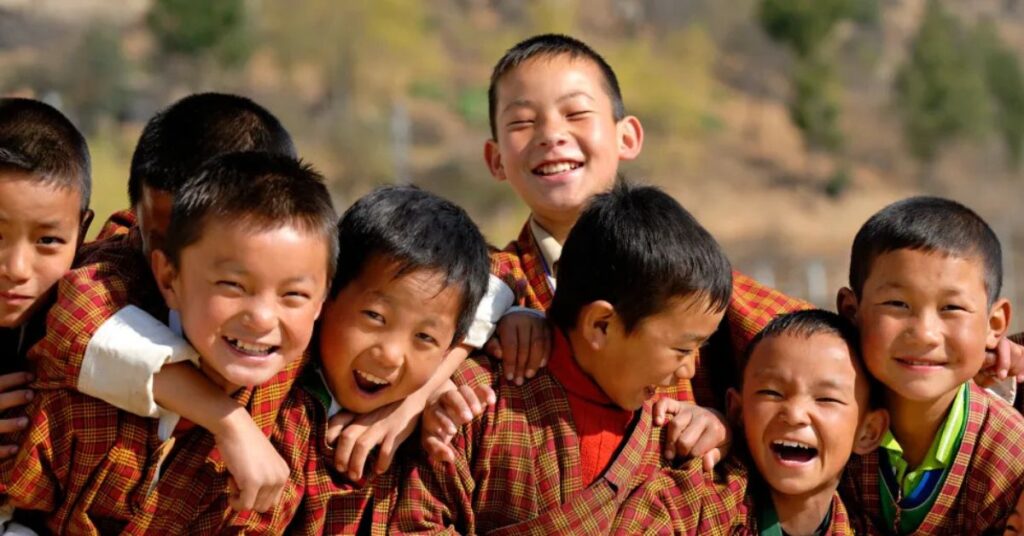Bhutan, a small kingdom in the Himalayas, has garnered global attention for its unique approach to development, prioritising Gross National Happiness (GNH) over traditional economic metrics like Gross Domestic Product (GDP).
This philosophy, rooted in Buddhist values, emphasizes the well-being of its people through a balanced focus on spiritual, environmental, and social health.
However, despite this idealistic framework, an increasing number of Bhutanese citizens are leaving the country. What drives this paradox in a nation that has made happiness a national priority?
Understanding Gross National Happiness (GNH)

Introduced by Bhutan’s fourth king, Jigme Singye Wangchuck, in the 1970s, GNH reflects the belief that material wealth alone does not lead to true happiness. Instead, Bhutan measures progress through four pillars:
- Equitable socio-economic development
- Cultural preservation
- Environmental conservation
- Good governance
These pillars are further divided into nine domains: psychological well-being, health, education, and community vitality. Every policy in Bhutan is evaluated based on its potential to enhance these aspects of life.
The goal is not just economic growth but also the creation of a society where citizens can thrive emotionally and spiritually.
The Reality Behind the Happiness Index
While Bhutan’s commitment to GNH has been praised internationally, it does not necessarily translate into high happiness levels for all its citizens. In fact, Bhutan ranked 95th out of 156 countries in the 2019 World Happiness Report.
This lower ranking is partly due to persistent poverty and inequality. Despite improvements in infrastructure and access to healthcare, many Bhutanese—especially those in rural areas—continue to struggle with basic living conditions.
A 2015 GNH survey revealed that while living standards and access to education were improving, psychological well-being and community trust were declining. Urbanization and modernization have led to increased stress and social fragmentation, particularly in cities where traditional values are harder to maintain.
Why Are Citizens Leaving?
Despite Bhutan’s focus on happiness and well-being, many citizens are choosing to leave the country. Several factors contribute to this trend:
- Limited Economic Opportunities: Bhutan’s economy is primarily agricultural, with a significant portion of the population relying on subsistence farming. While tourism and hydropower have boosted economic growth, job opportunities remain limited for young people seeking professional careers. Many Bhutanese leave in search of better employment prospects abroad.
- Rural-Urban Divide: The GNH index consistently shows that rural populations are less happy than their urban counterparts. Farmers, who make up a large part of the population, face challenges such as limited access to markets and modern amenities. As a result, many rural Bhutanese migrate to urban areas or overseas for better opportunities.
- Education and Skills Gap: While Bhutan has made significant strides in improving access to education, there is still a gap between the skills taught in schools and the demands of the modern job market. Many educated young people find it difficult to secure jobs that match their qualifications within Bhutan and opt for migration as a solution.
- Cultural Shifts: As Bhutan opens up to globalization and modern influences, younger generations are increasingly drawn to lifestyles that differ from traditional Bhutanese values. This cultural shift creates tension between older generations who prioritize GNH principles and younger people who seek more material success.
The Future of GNH
Bhutan’s government remains committed to its GNH philosophy despite these challenges. Prime Minister Lotay Tshering has emphasized that economic growth should not come at the expense of happiness or environmental sustainability.
However, balancing modernization with cultural preservation will be crucial as Bhutan navigates its future.
Efforts are being made to address the concerns driving migration.
For instance:
- Youth Employment Initiatives: The government is working to create more job opportunities for young people through entrepreneurship programs and vocational training.
- Rural Development Programs: To reduce rural-urban migration, initiatives aimed at improving infrastructure and access to services in rural areas are being prioritized.
- Sustainable Tourism: Bhutan’s “high value, low volume” tourism policy aims to generate revenue while preserving cultural heritage and the natural environment.
As Bhutan continues its journey toward sustainable development with happiness at its core, it will need to find ways to retain its citizens by offering them both spiritual fulfillment and tangible opportunities for prosperity within their homeland.